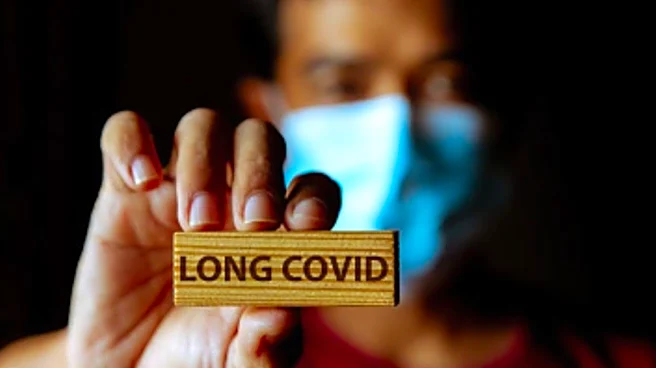When Covid-19 first emerged in late 2019, the world’s attention was consumed by its immediate threat — respiratory illness, pneumonia, and the devastating waves of hospitalisations and deaths. As vaccines
rolled out and the acute crisis began to subside, many assumed the virus would eventually fade into the background like seasonal flu. But five years on, researchers continue to uncover the virus’s lingering impact on the body—and the findings are sobering.
A CARTESIAN study, the largest multinational investigation yet into the pandemic’s hidden impact on the cardiovascular system, published in the ‘European Heart Journal’, has revealed that even a single Covid-19 infection may accelerate ageing of the arteries, the blood vessels that carry oxygen-rich blood throughout the body. This premature “vascular ageing” can increase the risk of heart disease, stroke, and other cardiovascular problems, even in people who had only mild symptoms of Covid.
The study adds to a growing body of evidence that Covid is not just a respiratory disease but one with long-term consequences for nearly every organ system, particularly the heart and blood vessels. For millions worldwide, who have already had Covid, this raises critical questions about their long-term health and what preventive steps may help reduce risks.
The Lasting Impact Of Covid
For years, the term Long Covid has been used to describe lingering symptoms—fatigue, breathlessness, brain fog—that persist weeks or months after infection. But researchers are now focusing on less visible aftereffects, such as changes in blood vessels.
Arteries naturally stiffen as people age, but Covid appears to speed up this process. This is not the same as feeling tired after the flu or recovering slowly from pneumonia. Instead, it involves a deeper physiological shift that can silently increase the risk of heart disease in the years ahead.
How Covid Affects The Cardiovascular System
The virus that causes Covid-19, SARS-CoV-2, enters the body by binding to ACE2 receptors, which are found not just in the lungs but across the cardiovascular system. Once inside, the virus can trigger:
Endothelial dysfunction: The endothelium, the thin inner lining of blood vessels, helps regulate blood flow and prevent clotting. Covid can inflame and damage this lining, making vessels less flexible.
Inflammation: The immune system’s overreaction, sometimes called a cytokine storm, floods the body with inflammatory chemicals that can scar tissues, including arteries.
Clotting disorders: Covid increases the risk of blood clots, which can damage arteries and raise the risk of heart attacks or strokes.
Over time, these effects contribute to arterial stiffness—the hallmark of vascular ageing.
What Has The New Study Found?
The study, which tracked nearly 2,400 participants across 18 countries, found that survivors of Covid-19 had stiffer arteries compared with those who had never been infected. The results were striking:
- Those who had Covid showed greater arterial stiffness, comparable to what might normally occur with several years of ageing.
- The changes were seen even in people who experienced only mild illness, not just those hospitalised with severe disease.
- Younger patients were not exempt—arterial ageing was observed across age groups.
In simple terms, a single infection seemed to fast-forward the vascular system’s biological clock.
Why Arterial Stiffness Matters
Arterial stiffness may sound abstract, but its consequences are very real. Flexible arteries expand and contract easily, helping regulate blood pressure and deliver oxygen efficiently. Stiff arteries, on the other hand, force the heart to pump harder, strain blood vessels, and raise the risk of:
- Hypertension (high blood pressure)
- Coronary artery disease
- Stroke
- Kidney damage
- Heart failure
These conditions are already leading causes of death worldwide. The idea that Covid could accelerate their onset underscores the need to treat the virus as more than a short-term illness.
Who Is Most At Risk?
While arterial ageing after Covid has been observed broadly, certain groups may face higher risks:
- Older adults, who already experience natural vascular stiffening with age.
- People with pre-existing conditions such as diabetes, obesity, or high blood pressure.
- Men who have shown higher cardiovascular risks after Covid-19 compared to women.
- Those with repeated infections, as cumulative exposure may compound the damage.
However, even young, otherwise healthy individuals are not entirely spared, making this a population-wide concern.
What Are The Lessons From The Pandemic?
The finding of accelerated arterial ageing fits into a wider pattern. Since 2020, cardiologists have reported higher rates of myocarditis (inflammation of the heart muscle), pericarditis (inflammation of the heart’s lining), and blood clots among Covid-19 patients. Some studies showed survivors were more likely to develop heart attacks or strokes within a year after infection.
This latest research on arterial stiffness provides a possible explanation: if Covid-19 accelerates vascular ageing, it could explain why survivors are at heightened risk of cardiovascular events even months after recovery.
What This Means For India
For India, where cardiovascular disease is already the leading cause of death, these findings are particularly concerning. India has one of the world’s youngest populations, but also one highly vulnerable to lifestyle-related heart risks—diabetes, hypertension, and obesity are widespread.
The pandemic infected millions across the country, many of them multiple times. If even mild Covid is silently ageing arteries, the long-term burden on India’s healthcare system could be significant. An uptick in strokes, heart attacks, and kidney disease may be felt in the coming years, straining already stretched medical resources.
Can Arterial Ageing Be Reversed?
The big question is whether the vascular changes caused by Covid-19 are permanent. Research is still ongoing, but there are reasons for cautious optimism.
Lifestyle interventions: Regular exercise, a heart-healthy diet, and avoiding smoking can improve arterial health and reduce stiffness.
Medications: Drugs used to control blood pressure and cholesterol may also help ease the strain on arteries.
Monitoring: For those who have had Covid, particularly more than once, regular check-ups to monitor blood pressure, cholesterol, and heart health are advisable.
The body has a remarkable ability to heal, but it requires support—and vigilance.
What You Can Do To Protect Your Heart After Covid
Even if you had a mild infection, it is wise to take steps to safeguard your cardiovascular health. Doctors recommend:
- Getting regular exercise (at least 150 minutes of moderate activity per week).
- Following a diet rich in fruits, vegetables, whole grains, and healthy fats.
- Maintaining a healthy weight.
- Limiting alcohol and avoiding tobacco.
- Monitoring blood pressure and sugar levels regularly.
- Consult a doctor if you notice symptoms like chest pain, shortness of breath, or unusual fatigue.
These are general guidelines for heart health, but they take on added importance in the post-Covid era.
What’s The Bigger Picture?
As the world moves further away from the acute crisis phase of the pandemic, attention is shifting to Covid’s long-term legacy. Beyond the visible scars of loss and disruption, the virus may leave behind a quieter, more insidious impact—accelerated ageing of vital organs, including the heart and arteries.
For individuals, this means rethinking how they approach health after infection. For governments, it means preparing healthcare systems to handle potential rises in chronic conditions that may be linked to Covid’s hidden aftermath.
The story of Covid is not just about masks, vaccines, and lockdowns. It is also about what happens in the body long after the fever subsides. The discovery that a single infection may age your arteries is a reminder that the pandemic’s effects will linger for years to come, shaping not only public health but also how we understand the body’s resilience in the face of a virus that has changed the world.


/images/ppid_a911dc6a-image-177100358713419284.webp)

/images/ppid_a911dc6a-image-177100354234781292.webp)
/images/ppid_a911dc6a-image-177100362541962778.webp)
/images/ppid_a911dc6a-image-177100367228935407.webp)


/images/ppid_a911dc6a-image-177100352975279320.webp)

/images/ppid_59c68470-image-177100254364289407.webp)

/images/ppid_59c68470-image-177100253375756091.webp)